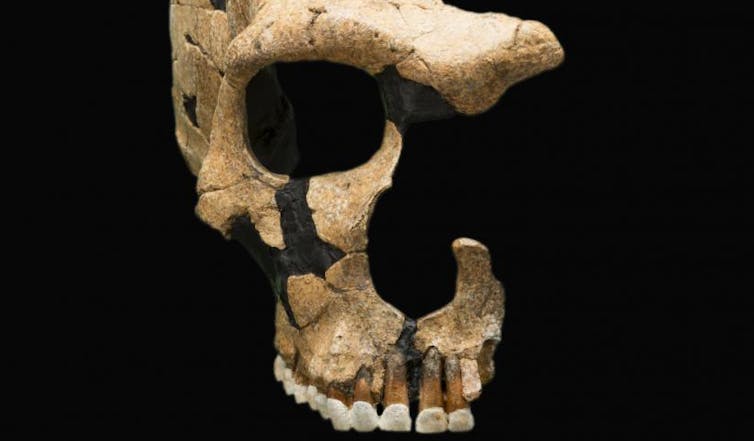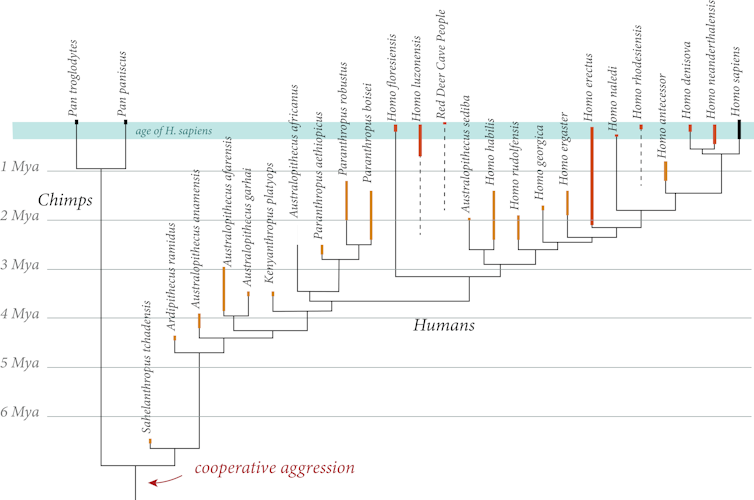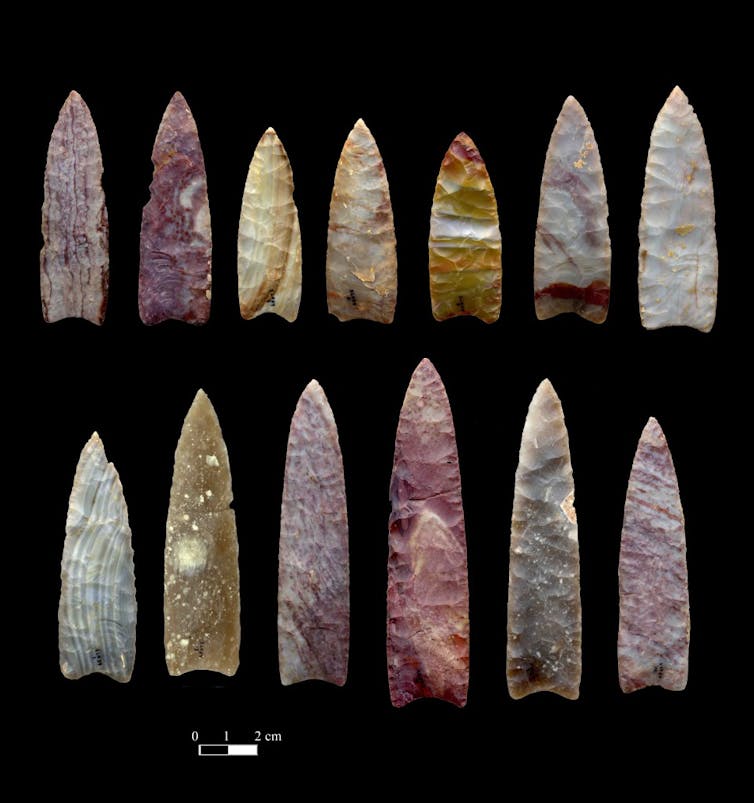Were other humans the first victims of the sixth mass extinction?
~ Nick Longrich, University of Bath

Nine human species walked the Earth 300,000 years ago. Now there is just one. The Neanderthals, Homo neanderthalensis, were stocky hunters adapted to Europe’s cold steppes. The related Denisovans inhabited Asia, while the more primitive Homo erectus lived in Indonesia, and Homo rhodesiensis in central Africa.
Several short, small-brained species survived alongside them: Homo naledi in South Africa, Homo luzonensis in the Philippines, Homo floresiensis (“hobbits”) in Indonesia, and the mysterious Red Deer Cave People in China. Given how quickly we’re discovering new species, more are likely waiting to be found.
By 10,000 years ago, they were all gone. The disappearance of these other species resembles a mass extinction. But there’s no obvious environmental catastrophe – volcanic eruptions, climate change, asteroid impact – driving it. Instead, the extinctions’ timing suggests they were caused by the spread of a new species, evolving 260,000-350,000 years ago in Southern Africa: Homo sapiens.
The spread of modern humans out of Africa has caused a sixth mass extinction, a greater than 40,000-year event extending from the disappearance of Ice Age mammals to the destruction of rainforests by civilisation today. But were other humans the first casualties?

We are a uniquely dangerous species. We hunted wooly mammoths, ground sloths and moas to extinction. We destroyed plains and forests for farming, modifying over half the planet’s land area. We altered the planet’s climate. But we are most dangerous to other human populations, because we compete for resources and land.
History is full of examples of people warring, displacing and wiping out other groups over territory, from Rome’s destruction of Carthage, to the American conquest of the West and the British colonisation of Australia. There have also been recent genocides and ethnic cleansing in Bosnia, Rwanda, Iraq, Darfur and Myanmar. Like language or tool use, a capacity for and tendency to engage in genocide is arguably an intrinsic, instinctive part of human nature. There’s little reason to think that early Homo sapiens were less territorial, less violent, less intolerant – less human.
Optimists have painted early hunter-gatherers as peaceful, noble savages, and have argued that our culture, not our nature, creates violence. But field studies, historical accounts, and archaeology all show that war in primitive cultures was intense, pervasive and lethal. Neolithic weapons such as clubs, spears, axes and bows, combined with guerrilla tactics like raids and ambushes, were devastatingly effective. Violence was the leading cause of death among men in these societies, and wars saw higher casualty levels per person than World Wars I and II.
Old bones and artefacts show this violence is ancient. The 9,000-year-old Kennewick Man, from North America, has a spear point embedded in his pelvis. The 10,000-year-old Nataruk site in Kenya documents the brutal massacre of at least 27 men, women, and children.
It’s unlikely that the other human species were much more peaceful. The existence of cooperative violence in male chimps suggests that war predates the evolution of humans. Neanderthal skeletons show patterns of trauma consistent with warfare. But sophisticated weapons likely gave Homo sapiens a military advantage. The arsenal of early Homo sapiens probably included projectile weapons like javelins and spear-throwers, throwing sticks and clubs.
Complex tools and culture would also have helped us efficiently harvest a wider range of animals and plants, feeding larger tribes, and giving our species a strategic advantage in numbers.
The ultimate weapon
The incompleteness of the fossil record makes it hard to test these ideas. But in Europe, the only place with a relatively complete archaeological record, fossils show that within a few thousand years of our arrival , Neanderthals vanished. Traces of Neanderthal DNA in some Eurasian people prove we didn’t just replace them after they went extinct. We met, and we mated.
Elsewhere, DNA tells of other encounters with archaic humans. East Asian, Polynesian and Australian groups have DNA from Denisovans. DNA from another species, possibly Homo erectus, occurs in many Asian people. African genomes show traces of DNA from yet another archaic species. The fact that we interbred with these other species proves that they disappeared only after encountering us.
But why would our ancestors wipe out their relatives, causing a mass extinction – or, perhaps more accurately, a mass genocide?

The answer lies in population growth. Humans reproduce exponentially, like all species. Unchecked, we historically doubled our numbers every 25 years. And once humans became cooperative hunters, we had no predators. Without predation controlling our numbers, and little family planning beyond delayed marriage and infanticide, populations grew to exploit the available resources.
Further growth, or food shortages caused by drought, harsh winters or overharvesting resources would inevitably lead tribes into conflict over food and foraging territory. Warfare became a check on population growth, perhaps the most important one.
Our elimination of other species probably wasn’t a planned, coordinated effort of the sort practised by civilisations, but a war of attrition. The end result, however, was just as final. Raid by raid, ambush by ambush, valley by valley, modern humans would have worn down their enemies and taken their land.
Yet the extinction of Neanderthals, at least, took a long time – thousands of years. This was partly because early Homo sapiens lacked the advantages of later conquering civilisations: large numbers, supported by farming, and epidemic diseases like smallpox, flu, and measles that devastated their opponents. But while Neanderthals lost the war, to hold on so long they must have fought and won many battles against us, suggesting a level of intelligence close to our own.
Today we look up at the stars and wonder if we’re alone in the universe. In fantasy and science fiction, we wonder what it might be like to meet other intelligent species, like us, but not us. It’s profoundly sad to think that we once did, and now, because of it, they’re gone.
Nick Longrich, Senior Lecturer, Paleontology and Evolutionary Biology, University of Bath
This article is republished from The Conversation under a Creative Commons license. Read the original article.
Nice reprint, Gail (or would you prefer "natasha"?), and thanks for the link to the original for the few omitted sentences. Typically, the comments contain plenty(?) of supportive, as well as contentious, thoughts. However, one (which I presume you saw, too) struck me as particularly "amusing"...
ReplyDeleteI agree with the writer that the greatest threat to the planet is population growth amongst homo sapiens. All this talk about having one car instead of two or changing to nuclear energy is relative nonsense. Reduce the world’s population to about 100 million over the next couple of centuries and we have a chance of surviving,
While the final comma, vs the more standard period, tells its own tale, the fact that the poster believes "we" have a "couple of centuries" to rectify "things" is downright laughable.It will be somewhat interesting to see how the comment sections, here and there, evolve over the next few days. Drop me a line sometime if you have the time and inclination. I hope life is going well for you, at least within appropriate expectations. In any event, I hope you have a festive and safe holiday season. Otherwise, I'll still refrain, "Bah, humbug!" Maybe add an occasional "Phooey!"
Hm, I was not aware there were omitted sentences, I was trying to follow attribution instructions and just copied the link provided by The Conversation. Oh well. I have cataracts in both eyes so I am missing a great deal, including cobwebs and dust around the house. Now that I qualify for Medicare, I'm having surgery this Monday & next and I'm afraid I will be in for a terrible shock when I can actually see how dirty my house has become lol. So that's my Thanksgiving.
DeleteA great companion piece I probably should have included is this: https://science.sciencemag.org/content/365/6456/897 from the abstract "Archaeological reconstruction of global land-use history illuminates the deep roots of Earth’s transformation and challenges the emerging Anthropocene paradigm that large-scale anthropogenic global environmental change is mostly a recent phenomenon."
Nice to hear from you Colin, I will have to search my email for your address if you don't hear from me, please send me a message!
Admittedly, the "missing sentences" might be due to my increasingly hinkey memory. I read the above first but didn't get to the link for the "original" until a couple hours later. So it was, perhaps, that my mind didn't recollect a couple of sentences when reading the latter. Regardless, those sentences were of little significance to the overall gist of either. No harm, no foul. :) Regarding your eyes, you have my utmost empathy and I sincerely hope that all goes well. Personally, I'm not the least bit "confident" in any "doctor" or their ministrations and preparations. I've seen too many go awry, sometimes terribly. On a bright note, though, cataracts removal has been around for a long time and with "luck" your physician has more than a little prior experience and knows ALL the tips and tricks. Otherwise, it will probably take me a couple of days before I'll get to the Science Mag article but thanks in advance.
Delete